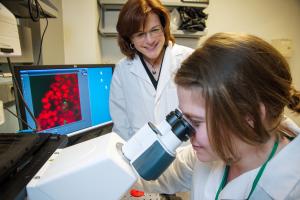美国国家耳聋和其他沟通障碍研究所(NIDCD)NIDCD成立于1988年,是组成美国国立卫生研究院(NIH)的研究所和中心之一。
其任务是开展和支持生物医学和行为研究以及听力,平衡,味觉,嗅觉,声音,言语和语言的正常和无序过程的研究培训。该研究所还开展和支持与疾病预防和健康促进有关的研究和研究培训;解决与有沟通障碍或障碍的人相关的特殊生物医学和行为问题;并支持创建帮助听力损失或其他沟通障碍患者的设备的努力。
据估计,美国有超过4600万人患有影响其听力,平衡,味觉,嗅觉,声音,言语或语言的疾病。NIDCD将全国注意力集中在这些领域,目标是改善数百万人的生活。NIDCD为帮助听力损失和其他沟通障碍患者以及推进这些领域的研究所需的知识体系做出了重要贡献。
NIDCD通过其在NIH进行基础和临床研究的校内研究计划以及通过其校外研究计划来完成其任务。NIDCD校外计划支持研究补助金,职业发展补助金,个人和机构研究培训补助金,中心补助金以及公共和私人研究机构和组织的合同。作为一个整体,该研究所支持并开展了1,300多个研究项目。该研究所还开展和支持疾病预防和健康促进以及与沟通障碍和障碍患者相关的特殊生物医学和行为问题的研究和研究培训。
NIDCD的校外拨款组合展示了基础和临床研究的平衡。校内研究计划涵盖各种主题,包括但不限于针对中耳炎的疫苗的开发,导致遗传性听力障碍的基因的鉴定和表征,与影响人类交流的肿瘤相关的基因以及声音障碍的治疗。

The National Institute for Deafness and Other Communication Disorders (NIDCD) NIDCD was established in 1988 as one of the institutes and centers that make up the National Institutes of Health (NIH).
The National Institute for Deafness and Other Communication Disorders (NIDCD) NIDCD was established in 1988 as one of the institutes and centers that make up the National Institutes of Health (NIH).
It is estimated that more than 46 million people in the United States suffer from diseases that affect their hearing, balance, taste, smell, voice, speech or language. The NIDCD focuses national attention on these areas with the goal of improving the lives of millions of people. NIDCD makes an important contribution to helping people with hearing loss and other communication disorders and to advancing the body of knowledge needed to advance research in these areas.
NIDCD fulfills its mission through its on-campus research program for basic and clinical research at NIH, as well as through its off-campus research program. NIDCD off-campus programs support research grants, career development grants, individual and institutional research training grants, center grants, and contracts for public and private research institutions and organizations. Collectively, the Institute supports and conducts more than 1,300 research projects. The Institute also conducts and supports research and research training in disease prevention and health promotion and on special biomedical and behavioral issues related to patients with communication disorders and disorders.
NIDCD's portfolio of off-campus grants demonstrates a balance of basic and clinical research. The on-campus research program covers a variety of topics, including but not limited to the development of vaccines against otitis media, the identification and characterization of genes that cause hereditary hearing impairment, genes associated with tumors that affect human communication, and the treatment of sound disorders.